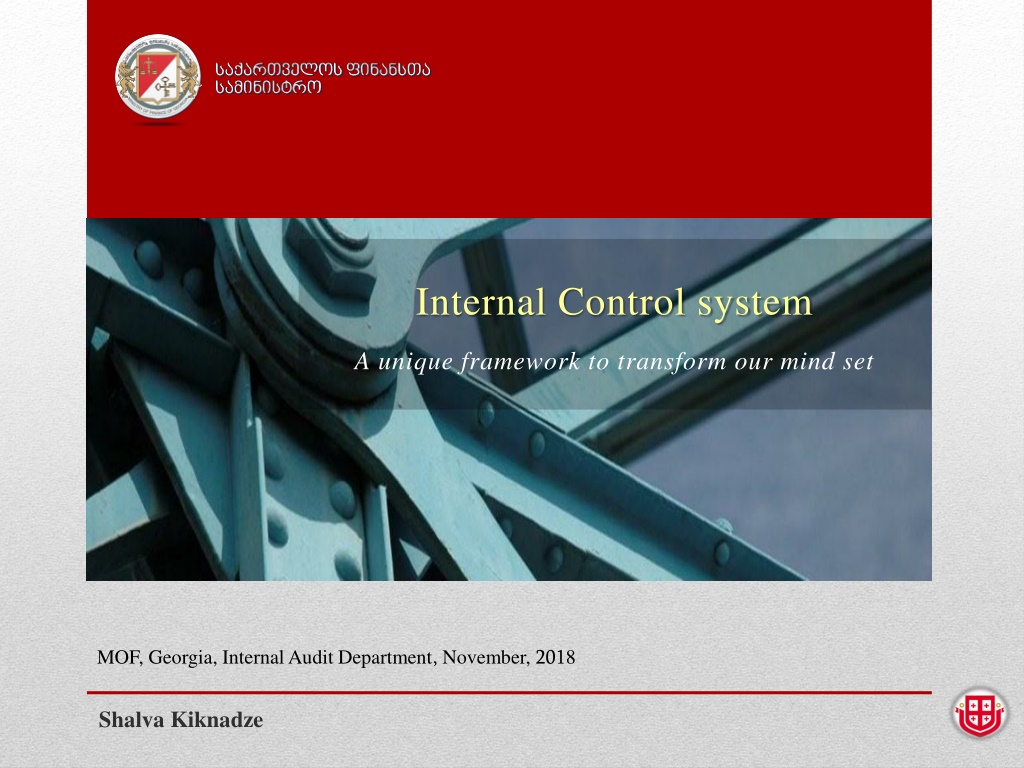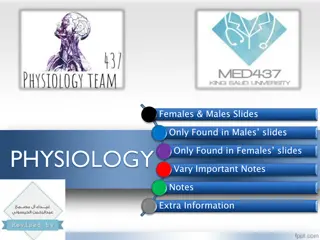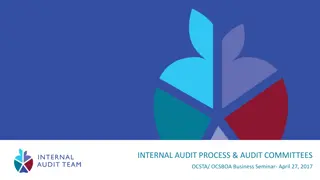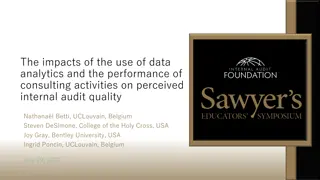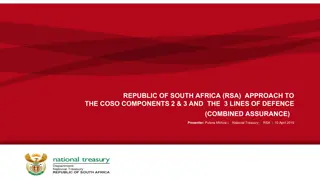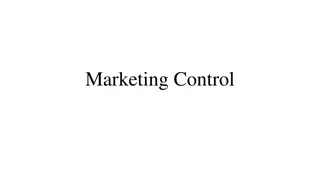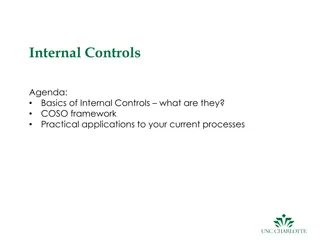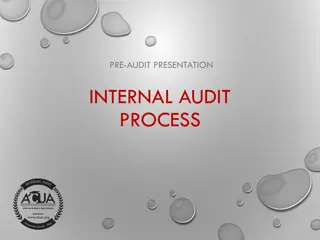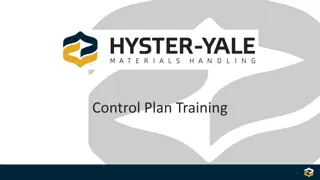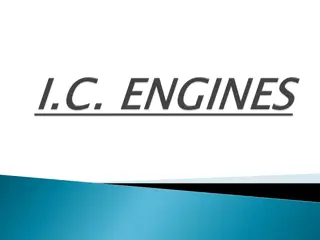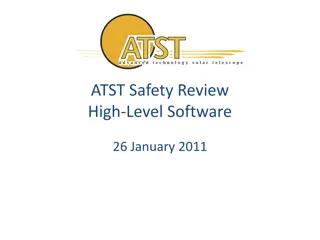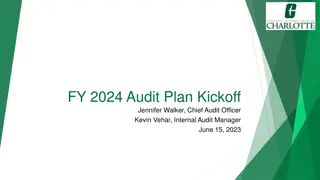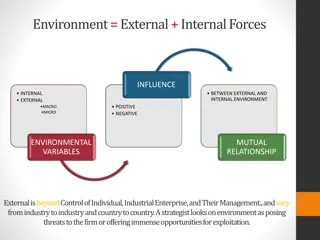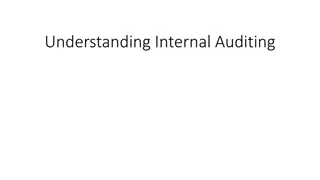Understanding Internal Control Systems and Processes in Organizations
Internal control systems play a vital role in governance and risk management within organizations. They encompass processes, measures, and outcomes that help in achieving objectives, ensuring compliance, safeguarding resources, and managing information systems effectively. This framework involves managerial accountability, strategic financial management, and addressing challenges faced by managers and auditors. The content delves into the multiple meanings of internal control, highlighting its significance in achieving organizational goals through efficient processes and information provision.
Download Presentation

Please find below an Image/Link to download the presentation.
The content on the website is provided AS IS for your information and personal use only. It may not be sold, licensed, or shared on other websites without obtaining consent from the author. Download presentation by click this link. If you encounter any issues during the download, it is possible that the publisher has removed the file from their server.
E N D
Presentation Transcript
Internal Control system A unique framework to transform our mind set MOF, Georgia, Internal Audit Department, November, 2018 Shalva Kiknadze
Main topics we will cover Internal Control System A process, measure or outcome; Implementing strategy for Financial Management and Implementing strategy for Financial Management and Control System Control System in Georgia in Georgia - - Managerial accountability, the first cornerstone of ICS in Georgian current administrative practice; How ICS saves disoriented managers and auditors; Main challenges we face.
Internal control multiple meanings A system or process A system or process - - the entirety of an organization s internal control system, i.e., an organization s internal control system; An activity or An activity or measure measure - - the actual measure to treat risks and to effectuate internal control, i.e., individual controls; A state or A state or outcome outcome - - an organization is in control, when it has achieved its internal control objectives.
Internal control a system or process Internal control is an integrated part of an organization s governance system and risk management, which is understood, effected, and actively monitored by the organization s governing body, management, and other personnel, to take advantage of opportunities and to counter the threats, in line with risk management strategy and policies on internal control set by the governing body to achieve an organization s objectives through, among other things: executing effective and efficient strategic and operational processes; providing useful information to internal and external users for timely and informed decision making; ensuring conformance with applicable laws and regulations, as well as with the organization s own policies, procedures, and guidelines; safeguarding the organization s resources against loss, fraud, misuse, and damage; and safeguarding the availability, confidentiality, and integrity of the organization s information systems, including IT. Source: Global Survey on Risk Management and Internal Control, IFAC (2011)
Internal control an activity or measure Activities performed to treat risks and effectuate internal control. Examples of actual control activities include managerial controls, such as executing the Plan-Do-Check-Act Cycle, or transaction controls, such as verifications, reconciliations, authorizations, physical controls, and supervisory controls that oversee transaction controls. Source: Global Survey on Risk Management and Internal Control, IFAC (2011)
How ICS can be build-in not build-up in public organisations ordinary fiscal cycle Budget Cycle within the SU M M C C Plan M M C C State Budget cycle State Budget cycle Act Act Do Do M M C C M M Check Plan C C M MC C Budget organisations M M Act Act Do C C C C M M Check Spending units (SUs) -Ministries C C M M M M Management cycle ? ?C C Control cycle
Internal control A state or outcome An organization is in control, when it has achieved its desired internal control objectives by treating the risks an organization faces in accordance with its risk management strategy and policies on internal control, while achieving the organization s objectives. Source: Global Survey on Risk Management and Internal Control, IFAC (2011)
Internal Control Internal Control always risk oriented and dynamic system General system logic sponsors and Owners System Assurance providers Assurance reports Risks identified Risks identified and assessed and assessed Operational reports and information/metrics on the system performance M C C Monitoring Objectives of internal Controls Operational Processes Policies or system s objectives and plans Control procedures Assurance reports System managers
Some attributes of Internal control concept creating obstacles in Georgian public sector organisations Designed to serve mainly broad social and public best interests not to interests of particular major groups; Is relatively new and ambiguous concept than another tasks of management and governance (e.g. Controlling, strategic planning, management accounting, inspection, forecasting, budgeting, quality, accounting, Auditing); Needs clear defined and strong ownership and champions to establish, maintain and keep as an influential mechanism;
Main Precondition to establish control processes in the Georgian public organisation They should be designed and maintained to treat/respond risks identified and therefore to enhance the chance accomplishing business objectives. Otherwise they are blind, dysfunctional, disoriented activities and center of non-recoverable costs. Thus we need well articulated objectives, strategies, annual plans. Establishing and maintaining Internal Control are primary responsibility for Senior management which can t be separated from theirs managerial accountability tasks. Due this treat we started to establish internal control system with defining clear managerial accountability arrangements based on budget programs.
Internal control integrated in managerial accountability Managers at all hierarchical levels of an institution shall be accountable to their superior managers for their activities and for the accomplishment of the goals and objectives of the institution by lawful, economical, effective and efficient management of funds. Source: Law of Georgia on Public Internal Financial Control, article 7.
What can be concluded when managers did not establish and What can be concluded when managers did not establish and maintain sound internal control systems maintain sound internal control systems They did not know how to manage this task; They think that there is already some adequate system of internal controls in place; They consider the task as not important one; They think that the task is outside theirs responsibility, and in the most worst case, It does not matter what outputs or outcomes they get from the processes or activities they carry out.
Why it is hard for senior managers to deal with internal Why it is hard for senior managers to deal with internal controls within a organization controls within a organization Not segregated political and administrative level within the organisation; Very weak political and supervisory pressure for poor performance from legislative body; Not articulated objectives and strategies; Decentralization and delegation is a taboo; Poor developed corporate sector;
Integration new FMC rules into our public administration system An overview Annual statement on Annual statement on organisational organisational Financial Financial managementr managementr and control system control system Minister Minister and CHU Deputy Minister Deputy Minister FMC Coordinator Deputy Minister Deputy Minister Program manager Deputy Minister Deputy Minister Program manager Deputy Minister Deputy Minister Program manager Deputy Minister Deputy Minister Program manager Deputy Minister Deputy Minister Program manager SLA SLA, SLA SLA, SLA SLA, Finance and Finance and Economic Economic Departement Departement SLA SLA, Performance Performance standards standards Performance Performance standards standards Performance Performance standards standards Performance Performance standards standards Budget Executor Progran Progran 2301 2301 Regularreports Regularreports, , EF&FIN EF&FIN Regularreports Regularreports, , EF&FIN EF&FIN Regularreports Regularreports, , EF&FIN EF&FIN Regularreports Regularreports, , EF&FIN EF&FIN Budget Executor Progran Progran 2303 Budget Executor Progran Progran 2302 Budget Executor Progran Progran 2303 Budget Executor Progran Progran 2303 2303 2302 2303 2303 SLA SLA Agreement on the terms for providing public services EF EF & & FIN FIN - Reports on the financial, non-financial perfomance and FMC issues
What internal auditors can do (and add values) when there What internal auditors can do (and add values) when there aren t clear articulated business objectives, priorities and aren t clear articulated business objectives, priorities and strategies strategies Help managers to set some suitable one; Consider the using internal control objectives categorized into thee main groups (Compliance, reporting, process efficiency and effectiveness); seek another alternatives.
